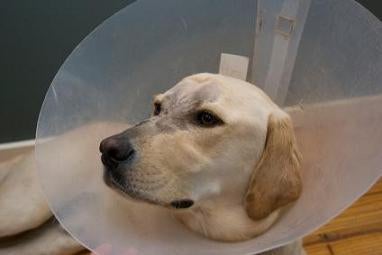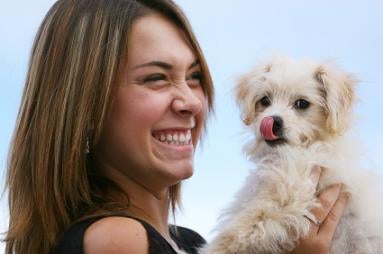Dog Hot Spots: Not Much Fun For Canines
When many people think of a "hot spot" they think of a hip night club or a restaurant where reservations are booked out months in advance. But for dogs, a hot spot is something entirely different, and something far less fun.
[google_ad:DOTR_CMS_468x60_InArticle1]
If you've ever noticed Fido itching and biting one spot on his body over and over again, then it's quite likely that he has a dog hot spot.
Don't fear, hot spots are far from lethal, but they can be very uncomfortable and sometimes painful for your furry friend. First, let's look at what dog hot spots are and some of the causes behind the itching, gnawing, scratching, and biting!

What Causes Dog Hot Spots?
The first thing you will notice about your dog if he has a hot spot is that he itches the same place over and over again. Hair may start to fall out, and depending on how thick the fur is you may notice a red spot that weeps or exudes pus. These areas are very painful to your dog, so touch him gently. These open sores can have a number of origins, all of them treatable.Dog hot spots are most common in dogs with thick, long coats. This is because moisture can get trapped next to the skin and can culture bacteria that overwhelms natural defenses and attacks the skin. This infection is technically called pyotraumatic dermatitis. Hot spots can also be caused by allergies, which is why they are more common in the summer. The problem here is that when the dog scratches the skin because he's itchy, he opens the skin up to infection, thus we have the bacteria problem once more. The good news is that this hot spot and the related infection are totally treatable.
Treatment For Dog Hot Spots
One of the first things you need to do to treat your dog is to clip the hair from around the edges of the hot spot. Do this gently because the area is very tender for your little guy. When you remove the hair from the area the wound can dry out, which is good because the bacteria needs a warm, moist environment to grow.Next you need to wash the wound out with soap and water to cleanse it. Depending on the severity of the hot spot you may need to visit your vet, who can give you cortisone creams or antibiotics to treat the wound itself. Your vet may also give you a cone to prevent the dog from further worrying the spot. Of course, this is only half of the solution.
In order to completely treat hot spots you need to address the underlying cause as well as the symptoms. In the case of a long haired dog who gets hot spots because of mats, tangles, and moisture issues the best solution is frequent grooming. These types of dogs, such as golden retrievers and cocker spaniels, need to be brushed at least twice a week, and bathed and clipped about once a month.
If your dog has some summer allergies there are other solutions. Make sure to vacuum your house frequently (dust mites, etc.) and to keep your yard free of noxious weeds. Lawn chemicals can also play a role in allergies, so switch to organic products. Also look into your dog's diet, which can cause allergies. Sometimes cheaper dog foods have ingredients like corn and soy that were not meant to be digested by dogs. Finally, talk to your vet about giving your dog an over-the-counter drug like Benadryl. Make sure to discuss the correct dosage for your pup, they need much less than most people do.

Home Remedies For Treating Dog Hot Spots
If you cannot get to your vet right away there are some home remedies that you can use to help relieve your canine companion's discomfort for a while. Try green or black tea compresses on the wound, which can be soothing and relieve the itching and pain. A medicated powder like Gold Bond is also safe to use to help stop itching. As far as healing the wound goes you can use vitamin E and anti-biotic creams on the wound as you would with a human being. Just make sure that your dog isn't licking the ointment straight off as soon as you put it on. If the wound is mild then these methods may work to completely heal your pup! But remember, you must address the underlying cause of the infection if you ever want to solve the problem for good.Hot spots can be an annoying fact of doggy life, but they are easily treatable if dog owners are watchful, attentive, and educated. If you discover your dog has a hot spot he will rely heavily on your ability to help treat it - now you can rest assured that you can take good care of him.
Please consult the services of a Professional Dog Trainer, Behaviorist or Veterinarian before implementing any of the advice contained on this site.








 Your Privacy Choices
Your Privacy Choices